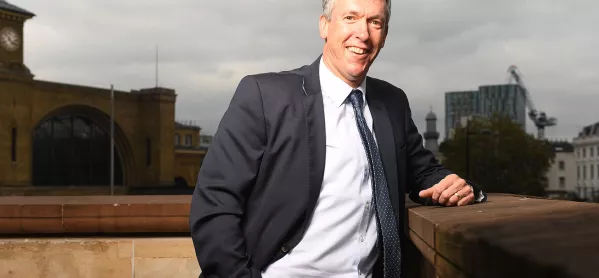- Home
- ‘City money pales into insignificance compared to teaching’
‘City money pales into insignificance compared to teaching’

Immediately before his interview with Tes, headteacher Stephen Munday has met with education secretary Damian Hinds to talk about the Chartered College of Teaching, of which he’s just been elected the first-ever president.
He has discussed with Hinds the College’s development of its new chartered teacher and leader accreditations, as well as ways to support teachers in their early careers and the College’s vision to make teaching “a profession led by a profession”.
He’s now in less salubrious surroundings than Westminster - a café above the platforms at London’s St Pancras station - from where Munday will soon be catching a train back to Cambridgeshire.
The journey he’s now talking about is his own career, which has seen him become a government adviser and awarded a CBE for services to education. That’s on top of being chief executive of a 10-school multi-academy trust, as well as an author, parent, church elder, regular golfer and irregular cricketer (according to his CV).
Munday’s career in education began when he was 23, at Bishop Stortford High School, where he taught economics, the subject he studied at Cambridge University.
However, his first job could have been outside the classroom - working in the City with a salary far greater than that of a newly-qualified teacher.
“There were breakfasts for undergraduates where merchant banks had discussions with pupils in certain subjects,” he says.
“My supervisor sent me forward on one occasion and said you ought to meet with this lot, but after half-an-hour, the chap looked at me and said, ‘Your heart’s not really in this, is it?’ and I said, ‘No.’”
“Economists might be earning lots of money, but that pales into insignificance compared to the privilege and possibility of genuinely supporting youngsters’ learning and development, and their enthusiasm and achievement of great things, which all youngsters can do in different ways.
“I guess I’ve been fortunate to see at least enough of that in my life, initially as a teacher and then over time working with colleagues, to oversee things that enable others in our group of schools to be able to do that. To me, that is deeply satisfying and worthwhile, and it’s why teaching matters a great deal and, despite the challenges, why I’ve never thought of getting out.”
Munday talks in fantastically long sentences, and sometimes asks himself questions at the end, which make the sentences even longer. But it’s a reflection of his energy, enthusiasm and self-belief.

Unashamedly comprehensive
He is chief executive of The Cam Academy Trust, which is made up of four secondary schools and six primaries, where, he says, “one of the absolutely enduring rock solid facets is that this is education for all.”
“It’s for all types, all backgrounds, and all abilities - unashamedly using the word ‘comprehensive’ - and it’s up to us to make that work and genuinely it can.”
If Munday is talking up comprehensive education, maybe that’s because there’s an irony, almost a guilt, that he’s a grammar school boy; his own academic success is not rooted in the comprehensive education system, which he now so strongly believes in.
“I do reflect on the fact when I look back on it that there were youngsters in my primary school, a couple of whom were from children’s homes, and another of whom I was friends with was from a particular council estate, and the moment I left primary school I never saw them again for the rest of my life, which in retrospect is a bit of a shame.”
He’s keen to make it very clear that he wouldn’t campaign for the abolition of grammar schools because “ultimately what matters is that there are great schools, and there are a number of ways of organising that”.
But then again, there are no grammar schools in his local authority area. So would he feel differently if his trust was, say, in Buckinghamshire, where campaigners argue that the large number of grammar schools damage comprehensives by taking the most talented pupils?
He admits that if he had a blank piece of paper on which to devise a new education system, he would write “comprehensive” all over it, and that his ideal would be for schools to “work powerfully together in groups.”

Munday’s passion for supporting learning has no doubt manifested in his son, who is studying politics, philosophy and economics at Oxford.
His own father was a social worker, and later a university lecturer, while his mother worked in the voluntary sector, so it’s a “public service background” he comes from, he says.
He takes some satisfaction that his economics background (he also taught business studies) makes him well placed to manage his trust.
His schools have saved thousands on insurance bills, for example, by bulk buying, and “on every single contract we drive a really hard bargain to make sure we get the best possible deals,” he says.
A truly great teacher
Munday says he feels “deeply privileged” to be president of the Charted College of Teaching.
“The really big agenda is how do we clarify what’s great about our profession?” he says.
He thinks the College needs to focus on making the profession a “great place to come into” and helping teachers “enjoy what it’s really all about”.
“If we get that right then I think a lot of the other significant challenges start falling in line.”
Asked about the new chartered teacher award, Munday says a teacher must display a deep knowledge of their subject, subject-specific pedagogy, and they will also have to pass a written exam and undergo lesson observations.
“It will define a really great teacher and great teaching practice,” he says.
“It will say ‘here’s something to which any of us in the teaching profession might want to aspire,’ which hasn’t been created by an external agency or a government agency.”
He’s keen for every teacher to have it to show they are a “truly great teacher.”
But won’t that devalue it, if everyone has it?
His response is emphatic: “No of course not!”
A truly great teacher, in Munday’s eyes, is his former economics teacher at Simon Langton Grammar School for Boys, in Canterbury.
Ray Jarvis taught there for 40 years and was someone who Munday could “relate to” and who made him realise “the significance of teaching”.
“I understood economics and its significance for the world in which we lived largely because my eyes were probably opened, and my interest fostered and motivated, through a very innovative and interesting and engaging and deeply sympathetic economics teacher that I had.”
And then comes another fantastically long comment - with two questions in the middle - setting out his vision for the future.
“There is only one ultimate solution to our education system and that is to have a great school everywhere for all youngsters right across the country.
“Of course it’s an ideal, but on the other hand I’m a teacher so I’m an idealist. I don’t think it’s unattainable, but do I think its deeply challenging? Yes of course, but it comes back to, in many ways, that it’s up to us.
“Of course there are all sorts of constraints, but are all of us committed to doing something about it, and do we genuinely seek to share and work with others and contribute beyond our own particular organisation and institution to make some sort of positive difference, and do we feel a compunction and moral imperative to do that? Because that’s what our profession is about and what we should be doing.”
With that, Munday goes off to catch his train. The world of education should feel lucky he never went into banking.
CV - Stephen Munday
Education
1975-82: Simon Langton Grammar School for Boys, Canterbury, Kent
1983-86: St John’s College, Cambridge
1986-87: Institute of Education, London, PGCE, Economics
1990-92: Institute of Education, London, MA, Economics Education
2009: Anglia Ruskin University, Honorary Doctorate in Education - for services to education
Career
1987-94: The Bishop’s Stortford High School, Hertfordshire,
1994-2000: Saffron Walden County High School, Essex (head of sixth form, deputy head)
2001-present: Comberton Village College, Cambridgeshire, principal
2012-present: Comberton and Cambourne Village Colleges, executive principal (relinquished executive principal of Cambourne Village College, Easter 2015)
2014-15: The Voyager Academy, executive principal
2011-present: Comberton Academy Trust (became The Cam Academy Trust in summer 2016), chief executive and accounting officer
Select further posts held
2006-12: Member of the Department for Children, Schools and Families (later Department for Education) Secondary Headteachers’ Reference Group
2008-present: Member of the DCSF (now DfE) Independent State School Partnership Group. Appointed as vice chair of this group in 2016.
2015: Appointed chair of expert group to write a programme of core content for ITT courses in England (following recommendation in Carter Review). Report and framework published July 2016.
2018: Appointed as president of Chartered College of Teaching
Keep reading for just £1 per month
You've reached your limit of free articles this month. Subscribe for £1 per month for three months and get:
- Unlimited access to all Tes magazine content
- Exclusive subscriber-only stories
- Award-winning email newsletters



